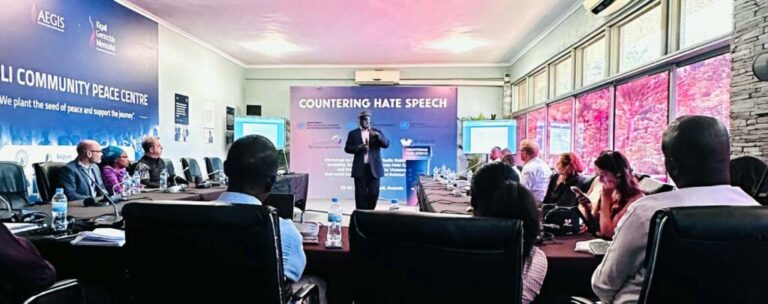
At the end of 100 days of Remembrance of the 1994 Genocide against the Tutsi in Rwanda, around 30 media stakeholders from different parts of the world gathered at the Kigali Genocide Memorial over three days last week, to share their experiences, knowledge and expertise while shaping recommendations for policymakers to address hate speech and prevent incitement to violence. Attendees included journalists, editors – including Radio Dabanga Editor-in-Chief Kamal Elsadig – content creators, fact checkers, as well as watchdogs.
As previously reported by Radio Dabanga, the workshop was organised by the Office of the Special Adviser on the Prevention of Genocide, International Residual Mechanism for Criminal Tribunals (IRMCT) and Aegis Trust and in partnership with L’Organisation de la Francophonie and the Templeton World Charity Foundation. The workshop focused on the role of all media stakeholders, including journalists, to address hate speech and prevent incitement to violence that could lead to genocide and it included examples of how media contributed to enable genocide in the past, including how the radio was weaponised to perpetrate the 1994 genocide against the Tutsi in Rwanda, as well as examples from the Holocaust and the Srebrenica genocide in 1995. The discussion benefitted from the experience of many journalists coming from conflict or post-conflict settings or with experience in reporting from conflict areas.
“Hate speech sets the stage and enables an environment where leaders and influencers can incite direct violence. History has taught us that hate speech and dehumanisation of the other has preceded and accompanied the commission of practically all genocides (…) today we see these historical tactics being put in place in social media, allowing hate to disseminate much faster, and to reach wider audiences”, the Special Adviser on the Prevention of Genocide, Alice Wairimu Nderitu, reminded in her introductory remarks, stressing the versatile role of media workers – educators, fact-checkers, storytellers and more – as gatekeepers, those who set the tone of the public discourse.
In an exclusive and impassioned interview with Kamal Elsadig, editor-in-chief of Radio Dabanga, the UN special adviser for genocide prevention, Alice Nderitu, emphasised the crucial role of media in countering hate speech: “No genocide in the world has happened without being preceded, accompanied, or followed by hate speech. Journalists from all over the world are now here to create a plan of action to counter this.”
“Hate speech planted the seeds of fear and hostility which produced a harvest of genocide here in Rwanda,” commented Freddy Mutanguha, CEO of the Aegis Trust and Director of the Kigali Genocide Memorial. “Atrocities did not stop with the Genocide against the Tutsi, and hate speech continues to turn neighbour against neighbour around the world today. That’s why we need your expertise, the combined expertise and experience of people in this room, to help us counter hate speech more effectively across the global media landscape.”
The workshop was officially opened by Dr Jean Damascene Bizimana, Rwanda’s Minister of Unity and Civic Engagement, who emphasised the importance of the prevention of atrocities which start with words, by reminding of the context of how the 1994 genocide against the Tutsi in Rwanda unfolded and the provisions of the UN Genocide Convention.
Setting the stage for the main discussion which looked into the causal relationship between hate speech and incitement to violence which can lead to genocide, war crimes and crimes against humanity, the IRMCT’s Chief Prosecutor Serge Brammertz explained how hate speech which reaches the extreme level of direct and public incitement to commit genocide violates the Genocide Convention, and is a crime under the statutes of the International Criminal Tribunals for Rwanda and former Yugoslavia, and International Criminal Court. The Prosecutor described the emblematic “Media case” which focused on the role of Rwanda’s Radio Télévision Libre des Mille Collines (RTLM), and Kangura magazine, which spread messages fuelling tensions which led to genocide, as well as cases from the former Yugoslavia, noting that trends today are shifting towards brazen genocide denial and hate speech which is not sanctioned in any way.
Journalists present at the workshop highlighted their responsibility to uphold ethical journalism, countering hate speech and preventing incitement to discrimination, hostility or violence. At the same time, attendees stressed the need for capacity building in this regard – especially at the executive and policy levels, to enable and support their efforts in addressing hate speech.
The discussion heeded some specific and concrete recommendations addressed to all relevant stakeholders, including regulatory bodies, official institutions, media houses, civil society and more.
These recommendations will constitute the core of a Plan of Acton for Media Stakeholders to Address Hate Speech and Prevent Incitement to Violence that could lead to Genocide and Related Crimes, which the Office of the Special Adviser on the Prevention of Genocide hopes to launch by the end of this year, a year which solemnly marks 30 years since the 1994 genocide against the Tutsi in Rwanda and sets a stage for next year’s 30th commemoration of the genocide in Srebrenica, which happened in 1995.
The Office of the Special Adviser and Aegis Trust concluded the gathering with an official signing of a Memorandum of Understanding, further strengthening cooperation in genocide prevention education and memorialisation efforts. [Source : Radio Dabanga]. (End)
